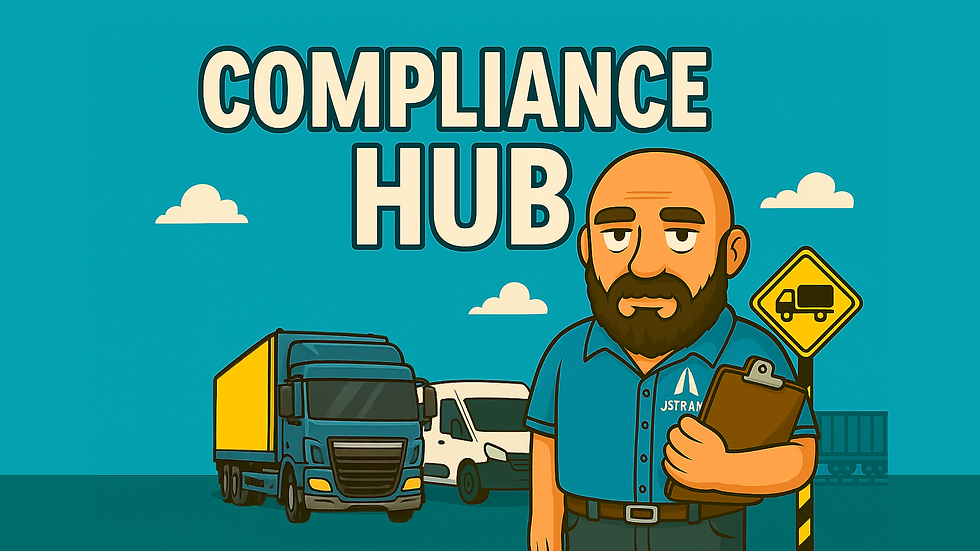Common Compliance Failures for Restricted Licence Holders
- stuart47304
- Jul 8, 2025
- 4 min read

Holding a Restricted Operator Licence gives you the ability to run goods vehicles for your own business — but it also puts you squarely in the sights of the DVSA and the Traffic Commissioner.
Too often, small businesses treat their licence as a formality. But ignoring your compliance obligations — even by accident — can lead to:
DVSA prohibition notices
Fixed penalties
Revocation of your licence
Public Inquiries
Business disruption or closure
This post highlights the 10 most common compliance failures made by Restricted Licence holders — and how to avoid them.
1. No Written Maintenance Schedule
The failure: Relying on “when it feels right” instead of a planned regime.
The consequence: Missed inspections, vehicles operating in unsafe condition, higher DVSA risk rating.
The fix:
✅ Create a written schedule of safety inspections (e.g. every 6 weeks)
✅ Include MOTs, brake tests, and servicing
✅ Share it with your maintenance provider and file each inspection result
2. Poor Daily Walkaround Checks
The failure: No proof that daily checks are being done, or checks done improperly.
The consequence: Prohibitions at the roadside, evidence of operator neglect.
The fix:
✅ Train all drivers on walkaround checks
✅ Use a standard defect sheet (paper or digital)
✅ File daily reports for at least 15 months
✅ Sign off and fix any reported issues
3. Not Monitoring Driver Licences
The failure: Not checking if drivers are still qualified or have penalty points.
The consequence: Unlicensed or disqualified drivers operating your vehicles — your responsibility.
The fix:
✅ Check each driver’s licence at least every 6 months (every 3 months is better)
✅ Use DVLA’s online service or a licence checking provider
✅ Keep a log of checks and results
4. No Record-Keeping System
The failure: Keeping transport records in a disorganised drawer or scattered files.
The consequence: Panic when DVSA or Traffic Commissioner requests documents.
The fix:
✅ Maintain clear digital or paper folders
✅ Organise by driver and vehicle
✅ Follow consistent naming and file retention policies
✅ Write and follow a Record-Keeping Policy
5. Missed Safety Inspections (PMIs)
The failure: Failing to carry out Preventive Maintenance Inspections regularly.
The consequence: Increased risk of mechanical failure, DVSA prohibitions, OCRS penalties.
The fix:
✅ Agree PMI intervals with your garage (e.g. 6 or 8 weeks)
✅ Record the schedule in a maintenance planner
✅ File reports and repair documentation
✅ Never exceed the agreed interval
6. Assuming Tachograph Rules Don’t Apply
The failure: Believing that a Restricted Licence exempts you from EU rules.
The consequence: Tachograph misuse, driver hours breaches, or data download failures.
The fix:
✅ Understand when tachograph rules apply (over 3.5t + 100km radius = usually in-scope)
✅ Fit and calibrate tacho units
✅ Issue and download driver cards
✅ Keep and monitor tachograph data
✅ If exempt, still maintain duty records under GB domestic rules
7. Not Rectifying Reported Defects
The failure: Treating defect reports as optional or ignoring minor issues.
The consequence: DVSA considers this a serious failure of operator control.
The fix:
✅ Investigate all reported faults
✅ Record what action was taken (e.g. repaired, part replaced)
✅ Sign off completed work with dates
✅ Keep defect reports for 15+ months
8. No Evidence of Financial Standing
The failure: Failing to maintain the required financial reserves.
The consequence: Revocation for failing to meet licence conditions.
The fix:
✅ Maintain proof that you meet the required funds (e.g. £3,100 for one vehicle, £1,700 per extra)
✅ Acceptable proof includes:
Bank statements
Overdraft facility
Credit agreement or finance plan
✅ Ensure funds are available continuously, not just during application
9. Parking or Operating from Unauthorised Sites
The failure: Using a home driveway, street, or unapproved location as an Operating Centre.
The consequence: Objections, complaints, enforcement action or Public Inquiry.
The fix:
✅ Only use sites that have been approved on your licence
✅ Notify the Office of the Traffic Commissioner if your site changes
✅ Get written permission from landowners
✅ Keep site plans, agreements, and planning documents on file
10. Thinking "It’s Only One Truck" Excuses You
The failure: Assuming small scale = no need for paperwork.
The consequence: DVSA and the Traffic Commissioner apply the same standards to all operators.
The fix:
✅ Take your responsibilities seriously from day one
✅ Build a small-scale compliance system that works
✅ Keep it simple — but consistent and complete
Bonus Tip: Failing to Respond to DVSA Letters
One of the fastest ways to get called to Public Inquiry is ignoring communication from the DVSA or Traffic Commissioner’s office.
Always:
Read letters and emails carefully
Respond professionally and within deadlines
Seek advice if unsure
How to Avoid These Failures: Simple Compliance System
Area | Must-Have |
Vehicles | Safety inspection planner, defect reports, repair history |
Drivers | Licence check log, training records, daily walkaround sheets |
Records | Filing system, digital backup, record-keeping policy |
Tachograph (if in-scope) | Download schedule, infringement reports |
Operating Centre | Proof of use, planning consent if needed |
Financial | Bank statements, cash flow forecast, proof of reserves |
Conclusion
Restricted Licence holders often fly under the radar — until they don’t.
Every one of the failures listed here can lead to enforcement action, loss of licence, or serious business disruption. But every one of them is preventable with a simple, proactive approach.
You don’t need expensive systems — just the right knowledge, consistent habits, and the willingness to stay compliant.
Next in the series:👉 What Is a Public Inquiry? A Guide for Restricted Licence Operators
